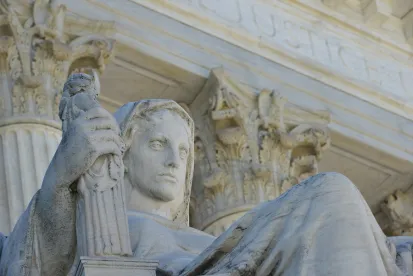On March 1, the U.S. Supreme Court heard oral arguments on a pressing issue facing medical practitioners: When can their care turn criminal in the context of prescribing opioids? During oral arguments, a majority of the justices seemed prepared to adopt a subjective good-faith standard that would protect practitioners from criminal prosecution if they sincerely and honestly believe their prescriptions were for a legitimate medical purpose and within the usual course of professional practice.
The Supreme Court is expected to render a decision by late June.
Dr. Xiulu Ruan and Dr. Shakeel Kahn were both convicted of unlawfully dispensing opioid painkillers. At their trials, the district courts rejected any consideration of good faith and instructed the members of the jury that the doctors could be convicted if they prescribed opioids outside the recognized standards of medical practice. The 10th and 11th circuits affirmed the instructions. Dr. Ruan was sentenced to 21 years in prison, and Dr. Kahn was sentenced to 25 years in prison.
During oral arguments, the doctors urged the Court to adopt a subjective good-faith standard and hold that medical practitioners cannot be convicted if they sincerely and honestly believe that their prescriptions were within the usual course of professional practice. The subjective good-faith standard “does not create some freestanding ... choose-your-own-medicine rule,” counsel for Ruan insisted.
According to Ruan and Kahn, to hold otherwise would impose criminal liability on medical practitioners for merely negligent conduct. “[T]he government’s submission is ... a negligence standard gussied up as something else,” argued counsel for Ruan. “There are a myriad of mechanisms for protecting patients from doctors who violate the standard of care ... That is not the function of Section 841 [of the Controlled Substances Act]. The question under 841 is not whether a doctor was a bad doctor but whether he was a drug dealer,” asserted counsel for Kahn.
The government argued the adoption of a subjective good-faith standard would leave medical practitioners “free of any obligation even to undertake any minimal effort to act like doctors when they prescribe dangerous, highly addictive ... drugs to trusting and vulnerable patients.” Instead, the government urged the Court to adopt an objective good-faith standard. Under this standard “[i]f a doctor is trying ... to act as a physician, he can’t be convicted under Section 841,” asserted the government’s counsel.
Justice Samuel Alito was the most critical of the doctors’ arguments and expressed concern that the doctors’ interpretation of Section 841 was untethered from the statutory text. “As for good faith, I don’t know where that word comes from at all. It’s nowhere,” stated Justice Alito.
Chief Justice John Roberts, joined by Justices Brett Kavanaugh and Neil Gorsuch, were wary of the practical implications of the government’s arguments. “[W]hat is it in the statute that separates innocent conduct from unlawful conduct?” Chief Justice Roberts asked counsel for the government. Justices Kavanaugh and Gorsuch expressed concern that the government’s objective good-faith standard would create close calls regarding whether a doctor’s conduct was for a legitimate medical purpose. Justice Kavanaugh asked, “If you’re on the wrong side of a close call about what you believed, you go to prison for 20 years?”




 />i
/>i
